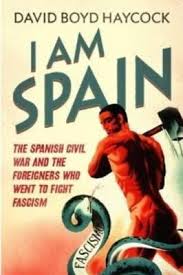Review: Writers at war
 This review appeared in the 34th issue of the newsletter of the International Brigade Memorial Trust and is reprinted here with the IBMT’s permission.
This review appeared in the 34th issue of the newsletter of the International Brigade Memorial Trust and is reprinted here with the IBMT’s permission.
David Boyd Haycock. I am Spain: The Spanish Civil War and the Men and Women Who Went to Fight Fascism (Old Street Publishing, Brecon, 2012).
I am Spain–the title is from a W.H. Auden poem–is a retelling of the story of the Spanish Civil War through the experiences of the British and American poets, writers, intellectuals, and artists who took part in or witnessed the conflict.
Against the chronology of the war from 1936-39, author David Boyd Haycock cleverly stitches together the testimonies and stories of many of its well known English-speaking protagonists. We meet writers and journalists such as Claud Cockburn, Kitty Bowler, John Dos Passos, Martha Gellhorn, Ernest Hemingway, Stephen Spender and George Steer. And we hear about those who enlisted with the fighting units and medical services resisting Franco’s uprising against the Spanish Republic. Among them are Felicia Browne, John Cornford, Bernard Knox, Laurie Lee, George Orwell, Esmond Romilly, Kenneth Sinclair-Loutit and Tom Wintringham.
The vivid prose and dramatic experiences and intrigues shared by these individuals make much of the narrative highly readable. We must hope therefore that the paperback version in particular will reach a new readership, stimulating sufficient interest among them that they will then want to find out and read more about the Spanish Civil War and the international volunteers who joined the anti-fascist cause.
But beware. This is no scholarly study. It is not founded on new research. There are no notes or references–even, annoyingly, for the occasional unattributed quotation thrown into the text. Nor is there a bibliography of the memoirs and biographies that Haycock mined to produce his book.
There is also a peppering of factual errors. The farewell parade in Barcelona for the International Brigades was on 28 October 1938, not 15 November. The Comintern’s decision to send international volunteers to Spain was taken on 16-19 September 1936, not 26 July–a crucial time difference when establishing the sequence of foreign involvement in the war and assessing Soviet motives in deciding to help the Republic. And why is the British Battalion repeatedly referred to as the“English-Speaking Battalion”?
Another weakness is that the first-hand accounts and opinions of these famous men and women are repeated without the necessary benefit of hindsight. In most cases their stories stand the test of time. But often highly contentious views, for example those held by George Orwell and John Dos Passos, are presented as fact, whereas we now know that the events in which they were embroiled were more complex and nuanced than they imagined or let on at the time.
To conclude, this is an engrossing read and a good starting point for anyone casually inter¬ested in the Spanish Civil War. But readers who want an accurate reference book or a more thoughtful analysis of the war and its key players should stick to the recognized historians in the field.
Author and journalist Jim Jump, son of IB veteran Jim Jump, is the Secretary of the International Brigade Memorial Trust and the editor of its newsletter.












